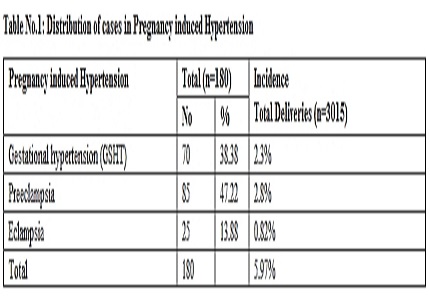A study to evaluate the perinatal outcome in pregnancy induced hypertension
Abstract
Introduction: Pregnancy-induced hypertension is the general classification for hypertension diseases during pregnancy, which include pregnancy-induced hypertension usually after 20th week of gestation (without proteinuria), pre-eclampsia (with proteinuria), and eclampsia (pre-eclampsia with convulsions). This disease is responsible for high maternal and perinatal morbidity and mortality rates, and is one of the main public health problems.
Material and Methods: It was retrospective study conducted between March 2013 to March 2016 in the department of pediatrics, Chirayu Medical College and hospital Bhopal. A total of 3015 mothers were delivered in department of obstetrics and gynecology. Out of these 180 were identified as having pregnancy induced hypertension. During the same period 100 mothers without any risk factor were included in the study.
Results: Out of 180 cases of hypertensive disorders of pregnancy, majority were of preeclampsia (47.22%), then Gestational hypertension 38.88%, percentage of eclampsia (13.88%). Incidence of Pregnancy Induced Hypertension– 5.97%. Incidence of low birth weight in PIH is 57.7%, preterm 44.2% and IUGR 20.4%, Still birth 8(4.4%) , early neonatal death 22(12.2%), Highest incidence of LBW (88%), Preterm (80%), IUGR (12%) is present in eclampsia group. In control group incidence of LBW is 22% (P<.001)**, Prmaturity-18% (P<.001)**, IUGR-6% P(<.05)*.
Conclusion: The purpose of this article is to give overview of burden of adverse perinatal outcome in high risk Pregnancy. Thus High risk pregnancy should be identified prospectively and then given special care, perhaps a major impact on overall perinatal loss could be reduced.
Downloads
References
2. Douglas KA, Redman CW. Eclampsia in the United Kingdom. BMJ. 1994 Nov 26;309(6966):1395-400. [PubMed]
3. R. B. Ness and J. M. Roberts. Heterogeneous causes constituting the single syndrome of preeclampsia: a hypothesis and its implications. American Journal of Obstetrics and Gynecology, vol. 175, no. 5, pp. 1365–1370, 1996.
4. Redman CW, Roberts JM. Management of pre-eclampsia. Lancet. 1993 Jun 5;341(8858):1451-4. [PubMed]
5. Chen XK, Wen SW, Smith G, Yang Q, Walker M. Pregnancy-induced hypertension is associated with lower infant mortality in preterm singletons. BJOG. 2006 May;113(5):544-51. Epub 2006 Mar 27. [PubMed]
6. Tranquilli AL, Giannubilo SR. The weight of fetal growth restriction in 437 hypertensive pregnancies. Arch Gynecol Obstet. 2004 Dec;270(4):214-6. Epub 2003 Aug 27. [PubMed]
7. Cunningham FG, MacDonald PC, Gant NF, Leveno KJ, Gilstrap LC, Hankins GDV, Clark SL. Distúrbios hipertensivos na gravidez. In: Cunningham FG, MacDonald PC, Gant NF, Leveno KJ, Gilstrap LC, Hankins GDV, Clark SLTranquilli AL, Giannubilo SR. The 'weight' of foetal growth restriction in 437. [PubMed]
8. Wagner LK. Diagnosis and management of preeclampsia. Am Fam Physician. 2004 Dec 15;70(12):2317-24. [PubMed]
9. Sibai BM. Diagnosis and management of gestational hypertension and preeclampsia. Obstet Gynecol. 2003 Jul;102(1):181-92.
10. Sibai BM, Caritis S, Hauth J; National Institute of Child Health and Human Development Maternal-Fetal Medicine Units Network. What we have learned about preeclampsia. Semin Perinatol. 2003 Jun;27(3):239-46.
11. Nesbitt RE Jr, Aubry RH. High-risk obstetrics. II. Value of semiobjective grading system in identifying the vulnerable group. Am J Obstet Gynecol. 1969 Apr 1;103(7):972-85.
12. Deorari AK, Arora NK, Paul VK, Singh M. Perinatal outcome in hypertensive disease of pregnancy. Indian Pediatr. 1985 Dec;22(12):877-81. [PubMed]
13. Yadav .S, Saxena et al: Hypertensive Disorder of Pregnancy and Perinatal outcome. Indian .J. Obs & Gyne. 1997, 47(4): 322-330. [PubMed]
14. Gray PH, O'Callaghan MJ, Mohay HA, Burns YR, King JF. Maternal hypertension and neurodevelopmental outcome in very preterm infants. Arch Dis Child Fetal Neonatal Ed. 1998 Sep;79(2):F88-93. [PubMed]
15. Nadkarni J, Bahl J, Parekh P. Perinatal outcome in pregnancy associated hypertension. Indian Pediatr. 2001 Feb;38(2):174-8. [PubMed]
16. Lin CC, Lindheimer MD, River P, Moawad AH. Fetal outcome in hypertensive disorders of pregnancy. Am J Obstet Gynecol. 1982 Feb 1;142(3):255-60. [PubMed]
17. Sibai BM, Anderson GD, Abdella TN, McCubbin JH, Dilts PV Jr. Eclampsia. III. Neonatal outcome, growth, and development. Am J Obstet Gynecol. 1983 Jun 1;146(3):307-16. [PubMed]
18. CLIFFORD SH. HIGH-RISK PREGNANCY. I. PREVENTION OF PREMATURITY THE SINE QUA NON FOR REDUCTION IN MENTAL RETARDATION AND OTHER NEUROLOGIC DISORDERS. N Engl J Med. 1964 Jul 30;271:243-9. [PubMed]

Copyright (c) 2016 Author (s). Published by Siddharth Health Research and Social Welfare Society

This work is licensed under a Creative Commons Attribution 4.0 International License.


 OAI - Open Archives Initiative
OAI - Open Archives Initiative


